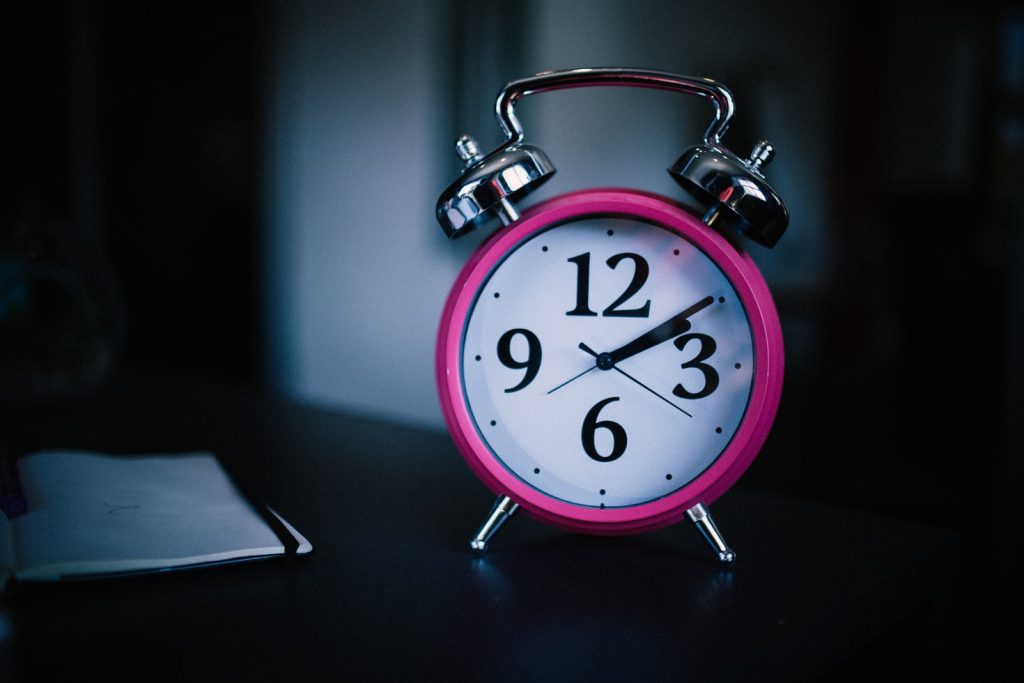Sleep is crucial to your health, whether you’re trying to live a mindful life, build muscle or simply live your best life. But, if you’re like most people, you want to know how to get to bed on time because you procrastinate.
However, there’s a psychological and societal reason why people stay up late and can’t get to bed early.
If you think about your day, chances are you:
- Get up
- Shower
- Do your daily grooming
- Eat breakfast
- Head out to work
As usual, you’re stressed at work, struggling through the day and something won’t align with your goals for the day.
Maybe you lose 10 minutes stuck in traffic, and you need to pick up coffee because you know that without it, you’re going to be super grumpy in the morning. Add in the extra few minutes talking to your neighbor or walking the dog, and you barely have time to sit down.
It’s crazy how you start the day with the intention to get things done, but because you can’t stop staying up late, you just don’t have time to do everything you want to do.
So, what happens? Procrastination, or as some people call it, “revenge procrastination.”
You sacrifice sleep for more free time.
I do it, too. In fact, even the CEOs of the world that brag about sleeping 2 – 4 hours a night are sacrificing sleep for something else. Most people want to learn how to go to bed on time but won’t fix the main issue: lack of free time in your schedule.
We will discuss how to go to sleep earlier, stop staying up late and begin doing it today.
How to Get to Bed on Time Tonight Using 6 Sleep Hacks

1. Create a Good Sleep Routine
Yup. You need a routine. It’s easier to do pretty much everything with a plan. But, what should your sleep plan be?
Thankfully, there are sleep statistics that explain how much sleep the average person needs per night:
|
Age Group |
Sleep Recommendation |
|
6 – 12 |
9 – 12 hours of sleep |
|
13 – 18 |
8 – 10 hours of sleep |
|
18 – 60 |
7+ hours of sleep at night |
|
61 – 64 |
7 – 9 hours a night |
|
65+ |
7 – 8 hours a night |
I know that’s it really easy to roll your eyes and skip this step. However, if you want to know how to get to bed on time, you need to know what “on time” means for you.
Use the table above to create your sleep plan. Insufficient sleep and a poor bedtime routine will have compounding consequences that force you into a destructive sleep pattern.
If you need to go to school or work and leave the house by 8 am, you’ll need to figure out how long it takes you to get ready in the morning, cushion it by 20 minutes and then determine what time to go to bed.
For example, if you need 1 hour to get ready in the morning, add 20 minutes to this time and you should be waking up at 6:40 in the morning. If you sleep 7 hours a night, you need to be sleeping (not sitting in bed thinking about the day) by 11:40.
2. Take a Shower or Bath – It’s Up to You
Do you want to know how to start going to bed earlier? Take a bath – or a shower. And you’ll also benefit from saving time in the morning.
A 2019 clinical review found that a 10-minute shower or bath about one or two hours before bedtime led to less sleep onset latency.
Why?
It likely has to do with a bath or shower changing your body temperature before bed.
So, as part of your bedtime plan, make it a point to add your shower into the mix.
3. Start with 15-minute Sleep Adjustment Increments
You already have a sleep routine that isn’t indicative of going to bed on time. And while it sounds great to change your sleep habits overnight, you’re likely setting yourself up for failure with such a drastic change.
Instead, you’ll want to make small sleep adjustments, initially.
Let’s say that you normally go to bed at 1 am, but you want to get to sleep earlier, you’ll want to make sure that you’re sleeping by 12:45.
After a day or two of going to bed 15 minutes earlier, you can readjust your schedule to go to bed at 12:30 and repeat until you hit your sleep time goal.
4. Take the Time to Stretch or Do Yoga
If you like to stretch or do yoga, you can add them to your before bed routine. There are many benefits to this bedtime ritual, including:
- Aids in sleep
- Eases pain
However, you don’t want to engage in fast-paced yoga or exercise before bed because it will have the exact opposite effect. A general rule of thumb is that if you’re sweating when stretching or doing yoga, slow down because you’re doing too much.
5. Exercise to Improve Your Nightly Sleep
Want to know how to get to bed on time? Exercise. A lot of people are filled with energy when their head hits the pillow, so they’ll spend hours thinking about the day, the next day, work, not falling asleep and so much more.
Exercise helps you reach deep sleep and will deplete your energy, too.
However, some people find that they can’t sleep well if they exercise too close to bedtime. Instead, try exercising a few hours before bed to see if it helps you repay some of your sleep debt.
6. Get Stuff Done During the Day
Getting to bed on time is not easy when you have no free time. The phenomenon of bedtime procrastination shows us that we’ll fight our natural body clock, suffer from poor sleep quality and enter sleep debt because we don’t have enough free time.
Why?
Many people procrastinate and never get what they need to get done before bed.
And since you’re doing chores, cooking, cleaning and doing everything in between until an hour before bed, you’ll stay up later. You’ll watch an extra episode of your favorite television show, FaceTime friends or troll social media because you want free time for yourself.
If you’re stuck in this rut and want to get to bed on time, you should try getting everything on your to-do list done during the day.
How to Get to Sleep Earlier by Changing Your Sleep Environment
If you want to learn how to sleep earlier and wake up early, you need to create an environment that is perfect for sleep. A few of the hacks to fall asleep earlier are:
- Change the thermostat. What’s the perfect sleep temperature? Studies suggest that your room should be between 60°F and 67°F if you want to maximize REM sleep – which you do.
- Remove distractions. Want to learn how to go to bed early? Get rid of the distractions that are keeping you awake. For example, it makes no sense to try going into bed earlier and then staying on your phone or laptop for 20 minutes. Instead, turn your phone upside down, leave the laptop in a different room and reserve your space for just sleeping. Also, try to keep your last screen time 20 – 30 minutes before you want to go to sleep.
- Darken the room. When I lived in an apartment, there was a bright light shining into my room in the middle of the night. There’s only so much tossing and turning, putting the pillow over my head and wishing that the electricity would go out that a single person could handle. Instead, I learned to darken the room. Blackout curtains were draped over the window, the sun never shined through, and if the world were ending, I would never have known. But. I could get to bed on time and sleep like the dead.
- Drown the noise out. As you can imagine, living in the bottom apartment also led to a lot of noise. Hearing children scream and jump from the heavens on to the ground jolted me out of bed for months. However, a white noise machine helped shut the unwanted noise out of my space and allowed me to sleep. If you have a lot of noise that keeps you awake at night or wakes you up before the alarm clock, try finding ways to eliminate the noise.
When trying to go to bed earlier, these tips really help. However, you can also try out natural sleep aids. A few of the hacks that work amazingly if you toss and turn a lot in bed, are:
- Tea. Herbal tea may be a good option for you. Chamomile tea can help you relax and fall asleep. However, if you get up in the middle of the night to go to the bathroom already, you may want to skip this one.
- Melatonin. Sleep experts recommend melatonin because it helps you induce sleep by regulating your circadian rhythm. If you have a sleep disorder or can’t seem to get sufficient sleep, melatonin supplements can help. However, these supplements should only be temporary and not relied on forever. Also, if you take too much melatonin, you might suffer from daytime sleepiness.
You can also try aromatherapy or other ways to wind down for the night. In fact, we wrote an entire post on this very subject.
Learn How to Wind Down for the Night with 12 Simple Tips.
How to Stop Staying Up Late Checklist

Are you a night owl that is trying to figure out how to stop staying up late at night? Sleep schedules are hard to maintain if you stay up late. An excellent checklist for how to get to bed early and stop staying up late are:
- Get stuff done during the day
- Stop feeling like you deserve extra time to stay up late
- Reduce blue light before bed (no smartphone)
- Slowly make the change
- Exercise
- Stretch
- Avoid caffeine, energy drinks and stimulants
- Avoid nicotine of any kind
- Skip naps
- Don’t watch TV or read in bed
- Get ready for bed before you’re tired
Nighty, Night!
Now that you know how to get to bed on time, it’s up to you to commit to following your sleep routine. Sure, you can go to a sleep specialist if nothing else works for you, but healthy sleep habits start with you.
A little effort, and following some of the tips above, will help you fight back against the effects of sleep deprivation, set an earlier bedtime and actually go to bed on time.

